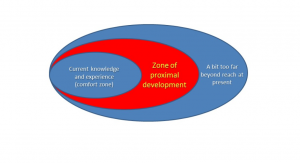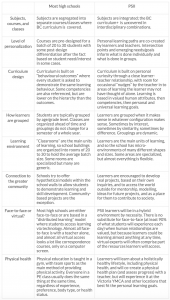This week we went to an Inquiry based private high school called Pacific School of Innovation and Inquiry (PSII). PSII is a grade 9-12 personalized learning school where students learn at their own pace, learn things they’re interested in, and decide their own curriculum, while also meeting or exceeding BC graduation requirements. Lately in our courses we’ve been discussing the Zone of Proximal Development (ZPD). The ZPD, a term coined by a psychologist named Vygotsky, is the place where there is a perfect balance between challenge and ability for students. The ZPD for every student is different, which PSII acknowledges, and uses to allow students to reach their full potential. Unlike typical BC high schools, at PSII, students are able to work as much, and as hard as they want on material that is engaging and challenging for them, without becoming overwhelmed by too much foreign material. PSII’s educational platform allows students to be in the ZPD for the majority of their school career.


For grading and report cards, PSII uses anecdotal report cards, which are report cards that omit grades for the first two terms of the school year, in favour of more in-depth comments/progress reports, and leave letter grades and percentages until the end of the school year. This helps relieve the stress of grades and percentages that many students feel, as well as promotes the idea that learning is on a continuum, and can be done at individual paces without risk of failure. In fact, parents can opt-in to anecdotal report cards for their children in all elementary schools! Further, although PSII’s students have this type of report card and they learn at their own pace/curriculum, they all meet BC’s graduation requirements, and very frequently graduate early and with very high GPAs.
The founder of PSII, Jeff Hopkins, has been advocating for all schools to become more Inquiry based, thus, he has created a website full of documents and resources that PSII uses that anyone is able to view, copy, modify, and/or use in any way that is conducive to better education. These include a values poster, curriculum organizer, valued human attributes poster, a competency assessment framework/grading template, an inquiry guide template and sample, and an inquiry process flowchart.

